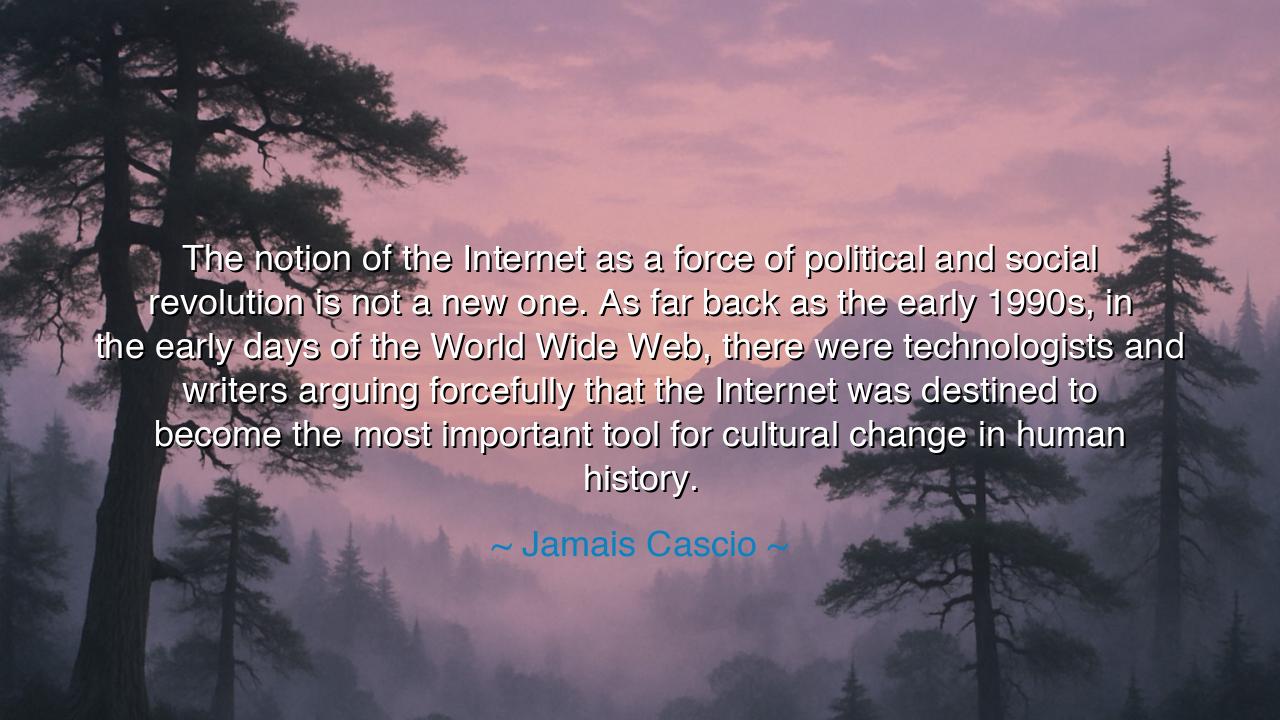
The notion of the Internet as a force of political and social
The notion of the Internet as a force of political and social revolution is not a new one. As far back as the early 1990s, in the early days of the World Wide Web, there were technologists and writers arguing forcefully that the Internet was destined to become the most important tool for cultural change in human history.






When the fires of the twentieth century dimmed and humanity stood at the threshold of a new age, Jamais Cascio spoke with prophetic clarity: “The notion of the Internet as a force of political and social revolution is not a new one. As far back as the early 1990s, in the early days of the World Wide Web, there were technologists and writers arguing forcefully that the Internet was destined to become the most important tool for cultural change in human history.” These words echo like the voice of an oracle foretelling the coming of a power that would reshape civilization—not through conquest or weaponry, but through connection. It was the dawn of an invisible empire, one that bound minds instead of lands, and made the thoughts of billions travel swifter than light itself.
In the ancient days, when empires were built with stone and steel, revolution came with the clashing of swords and the fall of kings. But Cascio reminds us that the Internet, this ethereal network of human thought, brought forth a new kind of revolution—one not of armies, but of ideas. The early architects of this realm—the scientists, the dreamers, the writers of the digital dawn—saw in it the seed of liberation. They believed that by weaving the world into a single web, barriers of distance, class, and power could be undone. For the first time in the long chronicle of humankind, a farmer in one corner of the earth could speak to a philosopher in another, and both could share their truths as equals beneath the boundless sky of the digital age.
And indeed, their prophecy came to pass. In the decades that followed, the Internet became the great equalizer, a mirror reflecting both the best and worst of humanity. It birthed movements that shook nations, toppled governments, and gave voice to the voiceless. Recall the Arab Spring, when the youth of the Middle East, long silenced under oppression, found their cry amplified through the networks of the web. Their words, carried by the wind of connectivity, sparked fires of change that no dictator could extinguish. The Internet, once a silent thread between machines, had become the beating heart of global awakening—a revolution without borders, fought not with violence, but with truth.
Yet the ancients would remind us: every flame that brings light also casts a shadow. The same network that unites can also divide; the same tool that empowers can enslave. Cascio’s words, though filled with hope, carry a quiet warning. The force of cultural change is not inherently good or evil—it is shaped by the hands that wield it. The Internet, like the sword of Damocles, hovers above our age with both promise and peril. It can enlighten, or it can deceive. It can spread knowledge like sunlight—or ignorance like plague. The true revolution, therefore, does not lie in the network itself, but in the souls of those who use it.
To understand this truth, one need only look to the story of Johannes Gutenberg, who centuries before Cascio’s time, unleashed a different kind of revolution with his printing press. With ink and press, he shattered the monopoly of knowledge held by the powerful, giving rise to the Reformation, the Enlightenment, and the modern world. Yet, just as the press birthed wisdom, it also spread falsehood and propaganda. So too with the Internet—the modern press of the soul—it magnifies whatever it touches. If we fill it with compassion, it becomes a temple of learning. If we fill it with hatred, it becomes a battlefield of minds.
The meaning of Cascio’s teaching, then, is this: the Internet is destiny made tangible, but destiny still demands guidance. It is the greatest tool for cultural change, but it is not yet the greatest triumph of civilization. That triumph will come only when we learn to use it with wisdom—to listen more than we shout, to build more than we destroy, to connect more than we divide. The Internet gives every human a voice; the challenge of our time is to ensure that our chorus sings harmony, not chaos.
So let this be your lesson, O seeker of the future: use the web not as a mirror of vanity, but as a bridge of understanding. Let every word you send across it carry truth, kindness, and purpose. Seek not fame in its endless noise, but meaning in its quiet depths. Remember that every message, every act, every shared thought adds to the tapestry of humanity’s story—a story that history will one day judge. And if you use this vast network for good, then the revolution Cascio foresaw will not merely be technological—it will be spiritual. For when the Internet becomes not just a tool of connection, but a force of compassion, humanity will at last fulfill its promise: one people, united by the boundless power of thought.






AAdministratorAdministrator
Welcome, honored guests. Please leave a comment, we will respond soon